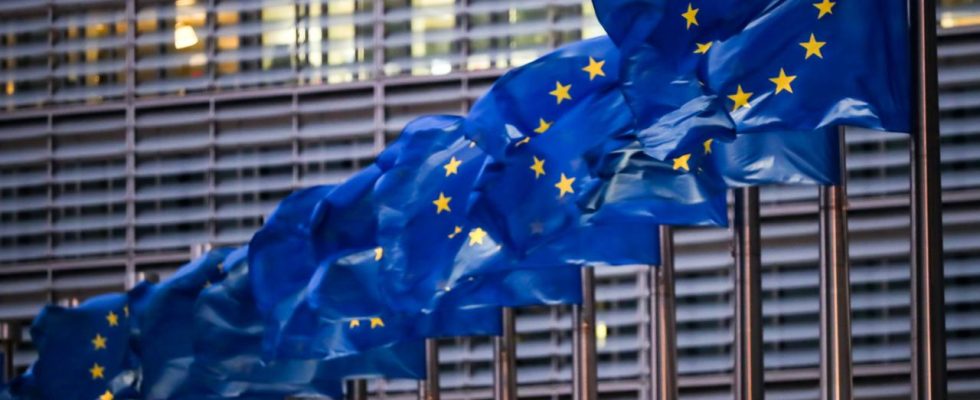There is a lot to discuss at the EU summit in Brussels: from Ukraine to China, from asylum reform to the EU’s financial demands. An overview of the main topics.
The power struggle in Moscow
The brief revolt by Wagner’s mercenary leader Yevgeny Prigozhin naturally also upset the agenda of the EU summit. After all, further developments in Russia and the possible consequences for the war against Ukraine are just as unpredictable as the future of the Wagner Group. Should the private army gather in Belarus, it could pose a threat to European security.
It is also unclear what danger an unstable Russia could pose. After the events of last weekend, the EU therefore wants to demonstrate unity – among itself and with partner countries such as the USA. NATO Secretary General Jens Stoltenberg is a guest, Ukrainian President Volodymyr Zelenskyj is there via video link.
It is expressly pointed out that the EU supports the armaments industry in Europe in expanding production capacities and has decided on more joint arms purchases. In the run-up to the NATO summit, which is scheduled to take place in Vilnius in mid-July, the heads of state and government also want to talk about cooperation with the western military alliance.
The Ukraine Aid
The support should not only continue, but be expanded – as a clear signal to the Russian President. Vladimir Putin is counting on the EU running out of steam. But he will lose this bet, according to Brussels.
The European Peace Fund, which finances most of the armaments aid for Kiev, is therefore to be increased by 3.5 billion euros. However, no further concrete decisions are to be expected. The EU Commission and member states such as Estonia or Lithuania want to ask Russia to pay for the reconstruction of Ukraine and use frozen Russian assets for this purpose. For example, by skimming off interest income. But that is considered to be legally difficult. Many governments doubt that the effort is worth it.
What a special tribunal for Russian war criminals should look like is also still open. And, according to the EU and NATO, security guarantees for Ukraine can only be discussed once the war is over.
The asylum reform
The debate is far from over with the compromise reached by the EU interior ministers. Hungary and Poland still do not want to take in refugees and categorically reject the planned fines. Hungarian Prime Minister Orban wants to let asylum seekers outside the EU wait until a decision is made on their applications. Corresponding agreements with third countries such as Tunisia also require Italy and Austria.
Other states such as Bulgaria, Denmark or the Netherlands could renew their demand for EU funds for the construction of border fences at the summit. Germany would have liked to have avoided migration being an issue at the summit. As is well known, the traffic light coalition does not agree. Many Greens in particular think that Home Secretary Nancy Faeser should never have agreed to the reform. And the federal government hopes that the European Parliament will be able to push through improvements for underage refugees in the negotiations with the EU states.
The money
EU Commission chief Ursula von der Leyen is demanding an additional 66 billion euros and points out that the world has changed dramatically since the budget negotiations in 2019. The corona pandemic, the Russian attack on Ukraine and galloping inflation have caused spending to rise sharply. The fresh money is intended to ensure that the EU can continue to support Ukraine, overcome the challenges posed by migration and promote important technology sectors.
However, the member states are only moderately enthusiastic about the demand and are wondering whether the coffers in Brussels – as von der Leyen claims – are actually already empty. As always, the self-proclaimed “frugal four”, i.e. Denmark, Sweden, Austria and the Netherlands, should be on the brakes. But the finance ministers in France and Germany also say: We don’t have a cent left at the moment.
China policy
This should actually be the focus of this meeting, but it has once again slipped a long way down the agenda because of current events. The heads of state and government don’t have much new to discuss anyway. How sharply Europe should distance itself from the increasingly aggressive world power is still a matter of debate.
EU Commission chief von der Leyen proposes tighter controls on foreign investments and technology exports. The EU should not decouple itself from China, but practice so-called de-risking: i.e. reduce one-sided and possibly dangerous dependencies on Chinese suppliers and trading partners. For example, when it comes to important raw materials or semiconductors.
Chancellor Olaf Scholz will report on the German-Chinese intergovernmental consultations. Germany is in favor of a balanced statement that addresses both the risks and the areas in which the EU depends on cooperation with China, such as on climate protection.

